Page one reprinted Van Horn's letter to friend, in which he described his train ride into Trenton, New Jersey, and a drunken old man who disturbed him on the ride. Howard Chawhip also retold a story of an old drunkard who only went to church to hear the singing, but later became a good man after a fly caused him to uncover his ears during…
Fletcher, Alice C.
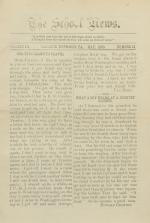

The first page opened with a poem titled “The Boy and the Bird,” author undetermined. The next article was titled “How the Indian School Girls in Sitka, Alaska, Got Ahead of the Indian Boys,” which concluded on the fourth page. Page two contained articles about returned students, John Davis (Pueblo) writing from his country home, and a piece…
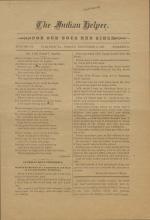
The first page opened with a poem, "Do the Right, Boys," followed by a letter from Richard Yellow Robe, entitled "An Indian Boy's Experience: Written by Himself as a Composition and Read at our last Month's Exhibition" about his escape from the battle in which Custer was killed and his subsequent enrollment in the Carlisle Indian School.…
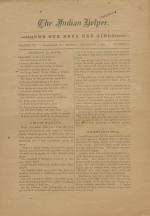
The first page opened with a short poem, "Grammar In Rhyme," followed by the memoir of Sioux student, Hope Red Bear about the Battle of the Big Horn, entitled "A Bit of Wild Life." There was also a piece about the treatment of horses called "If Horses Could Speak." The second page featured news of the passing of former student Dan Tucker'…
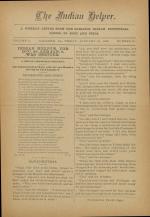
The first page opened with a notice that there were no Indian Helper newspapers published for December 28 and January 3rd. A notice followed: “A Novel Christmas Present: Our Superintendent Made with his own Hands a tin Cup for Each Employee.” Next was a poem, by “E.G.“dated Dec. 25, ’89 titled “The School Poet Again Stirred” about…
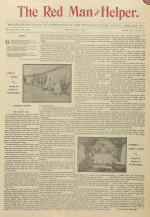
A description of this document is not currently available.
Note: This issue was also published as The Red Man (Vol. 16, No. 4) and Helper (Vol. 15, No. 37).
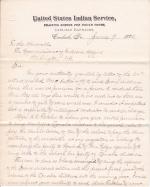
Due to the composition of the returning delegation of Pine Ridge and Rosebud Sioux students, Richard Henry Pratt, requests that Alice C. Fletcher accompany the delegation back to their homes. Fletcher would then be able to bring back the Omaha students she was already set to accompany back to the Carlisle Indian School
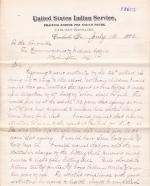
Richard Henry Pratt details the number of students he is able to accept from various Indian Agencies including the Rosebud, Pine Ridge, Kiowa and Comanche, Pawnee and Ponca, and the Cheyenne and Arapaho. Pratt provides instructions as to the preferred age and gender composition of the students and notes that he has already arranged for…
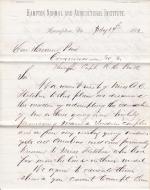
Samuel C. Armstrong writes that the Hampton Normal Institute is willing to educate three married Omaha couples along with three girls and one boy as government students if Alice C. Fletcher is able to bring them with the Sioux delegation going to the Carlisle Indian School. Richard Henry Pratt notes that he would be willing to accept married…
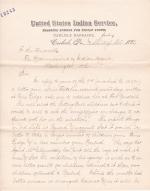
Richard Henry Pratt comments on a letter he has received from Alice C. Fletcher regarding student recruitment in the Rosebud and Pine Ridge Agencies. Fletcher recommends taking more students from Pine Ridge due to the actions of Agent V. T. McGillycuddy which allow returned students to succeed.
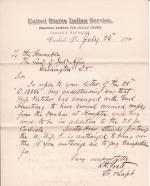
Richard Henry Pratt replies to a letter from the Office of Indian Affairs concerning a delegation of Omaha students being brought east by Alice C. Fletcher.
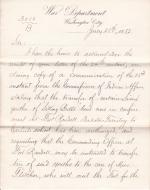
Robert Todd Lincoln, Secretary of War, acknowledges the letter from the Commissioner of Indian Affairs that A. C. Fletcher will select ten students from the Sitting Bull being held at Fort Randall with assistance from the Fort's Commanding Officer.
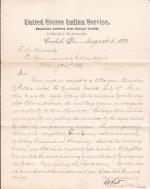
Richard Henry Pratt informs the Commissioner of Indian Affairs that he has received a letter from Alice C. Fletcher that the military officer in charge of the Sitting Bull prisoners at Fort Randell does not have permission to turn children over to her to take to Carlisle. Fletcher also notes that Charlotte Four Horns is anxious to come to…
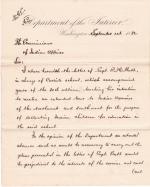
Acting Secretary of the Interior, M. L. Joslyn, instructs the Commissioner of Indian Affairs to stop Richard Henry Pratt from traveling West as had written previously. Pratt had desired to go West in order to bring back Sioux students from various agencies as well as a group of Navajo students.
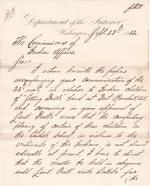
Correspondence regarding the enrollment of children from the Sitting Bull band of Sioux being held as prisoners at Fort Randall. The officer in charge of Fort Randall indicates that the parents of the eligible children do not wish to see their children to be enrolled at Carlisle. Pratt notes that he would prefer to speak to these parents to…
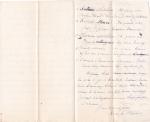
Alice C. Fletcher indicates that she has five Omaha pupils in her charge and desires that they be given permission to attend the Carlisle Indian School.
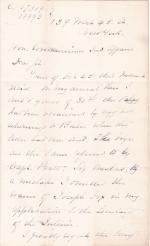
Alice C. Fletcher requests permission to enroll six Omaha students at the Carlisle Indian School. Fletcher recounts she had been fundraising to secure funds for their education and had nearly succeeded.
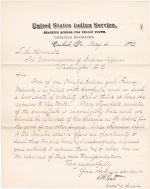
Richard Henry Pratt requests to send home Fannie Merrick and Mary Tyndall. Pratt notes that Alice C. Fletcher is set to visit the Omaha reservation and can escort the two students back.
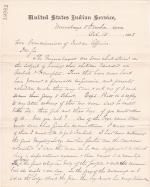
Alice C. Fletcher asks for permission to send Winnebago children to be educated at the Carlisle Indian School and the Hampton Institute.
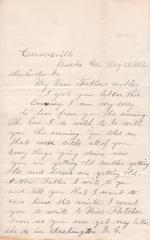
Se he du ba requests the return of his son Thomas Mitchell due to his age and the fact that he has been at the Carlisle Indian School for a year longer than his term of enrollment. Se he du ba also encloses a letter from Mitchell detailing his son's request to be returned home and his experience on outing.
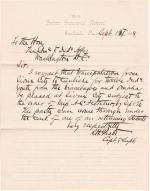
Richard Henry Pratt requests transportation for 12 students from the Winnebago and Omaha Agency be placed at Sioux City in care of Alice C. Fletcher for travel to Carlisle.
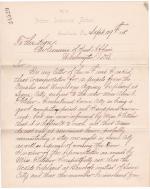
Alfred John Standing requests that his order for 12 tickets for the delegation from the Omaha and Winnebago Agency to be placed for Alice C. Fletcher at Sioux City be changed to 15 tickets at Bancroft.
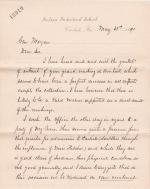
Alfred John Standing writes the Commissioner of Indian Affairs in regards to Carlisle accepting a party of Nez Perce students. Standing writes that only the physically and mentally capable students be accepted and that they could arrive in the month of June.
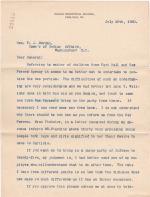
Richard Henry Pratt advises that the incoming parties from the Fort Hall and Nez Perce Agencies should not be combined due to the difficulties involved. He further asks why only ten students should come from the Nez Perce Agency when there are around 30 students willing to come to Carlisle. If a large party is authorized Pratt recommends…

Richard Henry Pratt responds to a letter by Edward McConnville, Superintendent of the Fort Lapwai School, who requests the return of David McFarland by his brother Philip McFarland. Pratt states that David has expressed a desire to stay at Carlisle in order to learn the blacksmithing trade.
